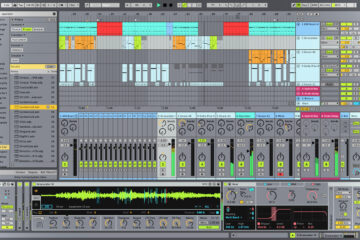
Why Switch from Adobe Audition?
Adobe Audition is a robust audio editing platform—but not for everyone.
- It’s expensive: $20.99/month adds up fast.
- Too complex: Many users need simpler tools.
- Heavy on resources: Slower machines struggle.
Whether you’re mixing music, recording podcasts, or editing audio for video—there are smarter, faster, and more affordable Adobe Audition alternatives.
What to Look for in an Audio Editor
Before you jump ship, check for:
- Multitrack editing
- Plugin support (VST, AU)
- Noise reduction & mastering tools
- Export options (WAV, MP3, FLAC)
- Latency and performance stability
Top Adobe Audition Alternatives Reviewed
1. Audacity
Features:
Open-source editor with multi-track, effects, and recording tools.
Pros:
- 100% free
- Cross-platform
- Active community
Cons:
- Dated UI
- No real-time FX previews
Best for: Beginners, hobbyists, and quick edits
2. Reaper
Features:
Full-featured digital audio workstation (DAW) with deep customization.
Pros:
- Affordable ($60 personal license)
- Full VST support
- Lightweight and fast
Cons:
- Steeper learning curve
- No built-in samples
Best for: Musicians, podcasters, and audio engineers
3. Ocenaudio
Features:
Simple editor with spectral analysis, real-time effects, and cross-platform UI.
Pros:
- User-friendly
- Lightweight
- Real-time VST effects
Cons:
- No multitrack editing
- Limited export options
Best for: Voiceover artists and light editors
4. Waveform Free
Features:
Professional-grade DAW from Tracktion with no feature restrictions.
Pros:
- Free with pro tools
- Powerful interface
- MIDI + audio support
Cons:
- Unconventional layout
- Limited tutorials
Best for: Music producers and creatives
5. Sound Forge Audio Studio
Features:
Reliable waveform editor with audio cleaning and mastering tools.
Pros:
- Intuitive interface
- CD burning support
- Time-stretch and pitch shift
Cons:
- Windows only
- No multitrack editing
Best for: Voice recordings and radio-style editing
6. Ardour
Features:
Open-source DAW with advanced routing, automation, and recording features.
Pros:
- Free (donation-based)
- Great Linux support
- Deep plugin integration
Cons:
- Complex setup
- Less polished UI
Best for: Advanced Linux users and pros
7. Adobe Audition
Features:
Multi-track editing, noise reduction, spectral view, podcast mixing.
Pros:
- Deep Adobe integration
- Precise tools
- Professional-grade output
Cons:
- Subscription-only
- Overkill for basic work
Best for: Studios and experienced audio professionals
Feature Comparison Table
| Tool | Free | Multitrack | VST Support | OS Support | Best For |
|---|---|---|---|---|---|
| Audacity | ✅ | ✅ | Partial | Win/Mac/Linux | Beginners |
| Reaper | ❌ ($60) | ✅ | Full | Win/Mac/Linux | Musicians & podcasters |
| Ocenaudio | ✅ | ❌ | Full | Win/Mac/Linux | Voiceover & radio editors |
| Waveform Free | ✅ | ✅ | Full | Win/Mac/Linux | Creators & musicians |
| Sound Forge Studio | ❌ ($59) | ❌ | Partial | Windows | Voice & waveform editing |
| Ardour | ✅ | ✅ | Full | Win/Mac/Linux | Advanced Linux users |
| Adobe Audition | ❌ ($20.99/mo) | ✅ | Full | Win/Mac | Professional studios |
Best Free Audio Editors
- Audacity – for simple needs
- Waveform Free – full DAW with no limits
- Ocenaudio – great UI and real-time effects
Best Paid Adobe Audition Alternatives
- Reaper – feature-rich, budget-friendly
- Sound Forge – simple, solid editor
- Adobe Audition – still the most comprehensive (if cost isn’t an issue)
Podcasting & Music Production Tools
| Use Case | Recommendation |
|---|---|
| Podcasting | Audacity, Reaper |
| Music Mixing | Waveform Free, Reaper |
| Sound Mastering | Adobe Audition, Reaper |
| Voice Editing | Ocenaudio, Sound Forge |
Plugin Compatibility (VST/AU)
All reviewed tools (except Sound Forge) support VST plugins. Reaper, Waveform, and Ardour offer full VST/AU automation and plugin routing.
FAQs – Choosing the Right Audio Editing Tool
1. What is the best free Adobe Audition alternative?
Audacity or Waveform Free, depending on needs.
2. Can I use VST plugins in these tools?
Yes, most support VST. Reaper, Waveform, and Ardour lead here.
3. What’s easiest for podcasting?
Reaper or Audacity (especially for quick editing and exports).
4. Do any work on Linux?
Yes—Ardour, Audacity, Reaper, and Waveform Free.
5. Is Reaper better than Adobe Audition?
For many, yes—especially for cost, performance, and plugin routing.
6. What’s best for real-time editing?
Ocenaudio offers the best real-time FX previews.
Conclusion – What’s the Right Audition Alternative for You?
You don’t need Adobe to edit audio well in 2025.
- For full DAW power on a budget: go with Reaper.
- For open-source fans: try Audacity or Ardour.
- For simplicity: choose Ocenaudio or Sound Forge.
- For advanced music projects: Waveform Free shines.
Adobe Audition is great—but now it’s optional.

0 Comments